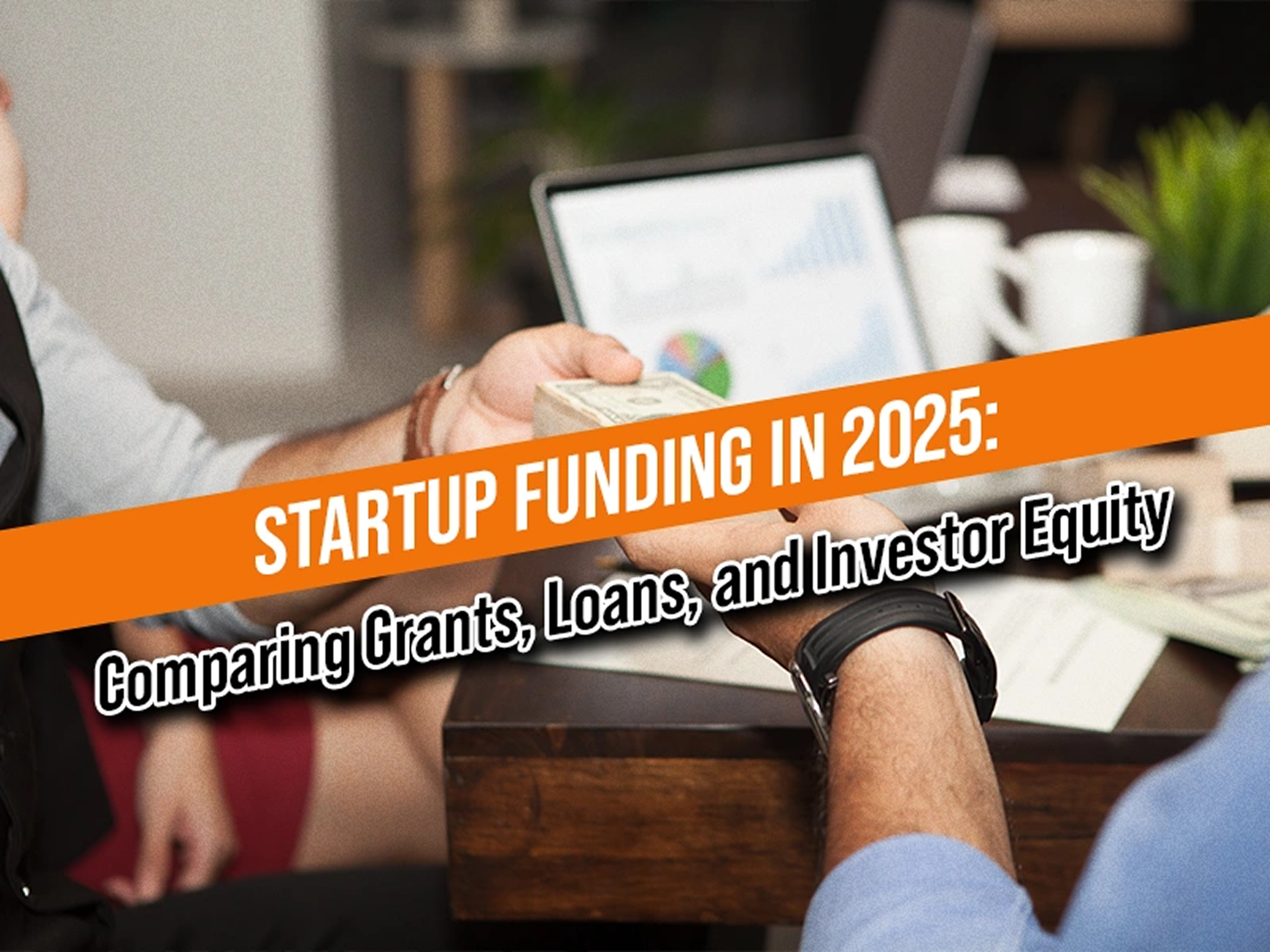
Securing funding for your startup is one of the biggest challenges you will face as an entrepreneur, and is a factor that will decide whether your startup idea sees the light of day or gathers dust in a corner. However, if you have a good pitch, you have many funding options to tap to secure capital for your business in 2025. While bootstrapping, family and friends, and crowdfunding could be your choice at the outset, these would prove inadequate once your startup begins to grow. For a developing startup, considering other avenues such as grants, loans, or investor equity is advisable. Understanding the pros and cons of these funding methods can help you make the best decision for your business's growth and prosperity.
Let's take a look at how grants, loans, and investor equity can help with your startup capital.
2025 Startup Funding Guide on Grants, Loans, and Investor Equity
Grants: Free Money, But Competitive
Grants are non-repayable funds provided by government agencies, private organizations, and nonprofits to support qualifying startups, especially those in innovation, sustainability, and underserved communities. Grant funds are generally subject to certain strict conditions.
Grant Sources
Obtain a Federal Grant
If your business qualifies, you could secure a grant from the federal government to grow your business. While you could face stiff competition securing these grants, with stricter qualifying requirements, you will likely have access to a larger grant amount and other resources. For instance, the US Small Business Administration offers manufacturing grants for the Made in America initiative, and grants for Small Business Innovation Research, Small Business Technology Transfer, State Trade Expansion Program (STEP), etc.
Obtain state or non-profit grants
Alternatively, you could also secure a state government grant, which is meant to promote a certain kind of business and generate employment opportunities within a state or region. Non-profit organizations may also offer grants for businesses in alignment with their goals. The amount you can secure through state and non-profit grants is usually less than what you could get through federal grants.
Grants From Corporate Houses
Many corporations also offer grants to startups under their social responsibility initiative or through their charitable trusts. These grants are meant to further the development of their business and industry. However, accepting a grant from a corporation will mean aligning with its mission, vision, and goals, apart from other restrictions the company may place on your business. Programs like America's Seed Fund offer up to $2 million for startups in AI and biotech. Other grants, such as the Cartier Women's Initiative, provide funding for female entrepreneurs focused on social impact.
Pros:
- Grants do not have to be repaid like loans
- Unlike venture capital or angle funding, you do not have to give up ownership or equity in your company
- Grants are often offered to support research, technology, and social impact startups.
Cons:
- The process of applying for a grant is highly competitive
- Grants have strict eligibility requirements for applicants
- While the funding may be relatively free, the amount you can secure through a grant is limited.
Loans: Structured Financing with Repayment Obligations
Loans remain a traditional funding option, offering startups structured capital infusions through banks, government programs, and online lenders. For additional safeguards, you can also opt for a US Small Business Administration (SBA)-backed loan such as a 7(a), 504, or microloan. Community Development Financial Institutions (CDFIs) offer support for startups in underserved areas with accessible loan programs.
Pros:
- Getting a loan for your business allows you to retain full ownership
- A loan comes with predictable repayment terms so you can plan ahead
- Government-backed loans offer lower interest rates making repayments easier
Cons:
- Taking a loan to finance your startup requires repayment with interest
- Obtaining a loan will depend on your creditworthiness, and the lender may also require collateral.
- A loan can place a huge strain on cash flows if your startup revenue is inconsistent
Investor Equity: Funding with Shared Ownership
Investor equity involves exchanging a portion of your business for financial backing from angel investors, venture capitalists, or crowdfunding platforms. Let's take a look at each of these funding alternatives.
Angel Investors
Angel investors are high-net-worth individuals who provide capital to early-stage startups, often in exchange for equity. They play a crucial role in the startup ecosystem, combining funding with invaluable expertise and network connections. Based in innovation hubs, these investors provide financial assistance along with strategic guidance and mentorship to startups. Finding an angel investor will significantly accelerate your startup's development and set it up for future success.
Venture capitalists
Venture capitalists play a key role in startup development by providing crucial funding, industry expertise, and invaluable networks that propel early-stage companies toward growth. Venture capitalists often provide more than just capital, offering strategic guidance and a wealth of experience to help a new company navigate challenges and seize emerging opportunities. Venture capital firms generally choose to invest heavily in high-growth startups, particularly in tech and healthcare.
Crowdfunding platforms
Crowdfunding platforms are another way in which startups can secure funding. These are digital launchpads that empower startups and entrepreneurs to raise capital from a broad network of small-scale investors and interested supporters. These platforms enable innovators to present their ideas to a global audience, bypassing conventional financing routes like traditional banks or venture capital firms. Not only do crowdfunding sites help gather essential initial funds, but they also serve as valuable tools for market validation and brand building.
Pros:
- Opting for investors to fund your startup can ensure large funding amounts for your business.
- Apart from funding, you will also receive mentorship and industry connections through your investors
- Startup funds received through angel investors, venture capitalists, or crowdfunding do not come with any immediate repayment obligations
Cons:
- Getting investors for your startup can lead to a loss of partial ownership and control
- Investors in your startup would want a say in your business and could influence business decisions
- Your investors will only stay if you can meet their high expectations for growth and profitability
Choosing the Right Funding Option
The best funding method depends on your startup's needs, industry, and growth potential. If you want non-repayable funds, grants are ideal, but competitive and are only available for certain kinds of businesses. Loans provide structured financing while allowing you to retain ownership, but require repayment with interest. Investor equity offers large-scale funding and mentorship but comes with shared control.
Startup funding in 2025 is more diverse than ever, with grants, loans, and investor equity offering unique advantages. As a startup entrepreneur, you should carefully assess your financial needs, long-term goals, and risk tolerance before choosing a funding path for your business.
Simplify Funding Decisions with Finlotax Expertise
Confused about how to go about funding your startup? Finlotax has your back! We take the guesswork out of funding your startup and help you choose the right option that aligns with your growth stage, risk appetite, and long-term goals. Whether you're bootstrapping, pitching to investors, or navigating government incentives, our expert financial advisors are here to simplify the process and maximize your financial advantage. Reach out today at 4088229406 and take the first step toward smarter, sharper startup financing.

